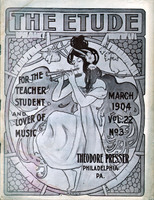Desire.—The bass voice may ascend to E-flat or E-natural above the bass staff; the baritone to an F or G; the tenor to a B-flat above the baritone. The compass of each of these voices should be about two octaves. The contralto should sing a fifth line F for her upper note; a mezzosoprano to A-flat, and the lyric and dramatic sopranos to C above the staff. The contraltos rarely exceed two octaves in compass, nor do the mezzosopranos. The dramatic soprano sometimes uses one or two notes in excess of two octaves, and a peculiarity of the lyric soprano is an ability to reach very low notes, giving, not infrequently, a compass of two octaves and a half, and sometimes three octaves. The lower notes, however, are of little value, as they rarely occur in the lyric soprano repertory.
S. A.—1. Excellent exercises to correct a breathiness in the tone are to be found in Behnke and Pierce's first book under the head of "Attack," observing the printed directions in the front of the book.
2. One cannot give you exercises for trembling of the voice without first ascertaining the cause. A voice usually trembles as the result of incorrect or extrinsic muscular interference.
M. P. E.—You are rapidly arriving at a point where the physical demonstrations of singing are a hindrance rather than a help. That furrow in the tongue will adjust itself, if when singing you will allow it to lie loosely in the bottom of the mouth, the end just touching the lower teeth. We have heard that too much learning was a dangerous thing. Too much attention to breathing is equally dangerous. Theoretically Oscar Guttman's book is very interesting reading; practically it is of little value. It has been translated. I don't believe you need a physical culture course for your trunk. Madame Lehmann's singing belies her instructions to "force the breath against it, and hold it there fast." You see, we are skeptical; there are so many contradictory theories presented. The best breathing exercise in the world consists of slowly and noiselessly inhaling the breath, consuming about ten seconds in the process, retaining it ten seconds more, with the throat open, controlled at the waist; then as noiselessly exhale it, consuming ten seconds in that process. After a month or two you will be able to add a second or two to each act, and will have made a few discoveries about breath control.
Inquirer.—Many male teachers have lived who have taken vocal pupils from the beginning and finished with them at the highest degrees of excellence. It is difficult to imagine what your informant has experienced to provoke such an ungenerous view of male singing teachers.



